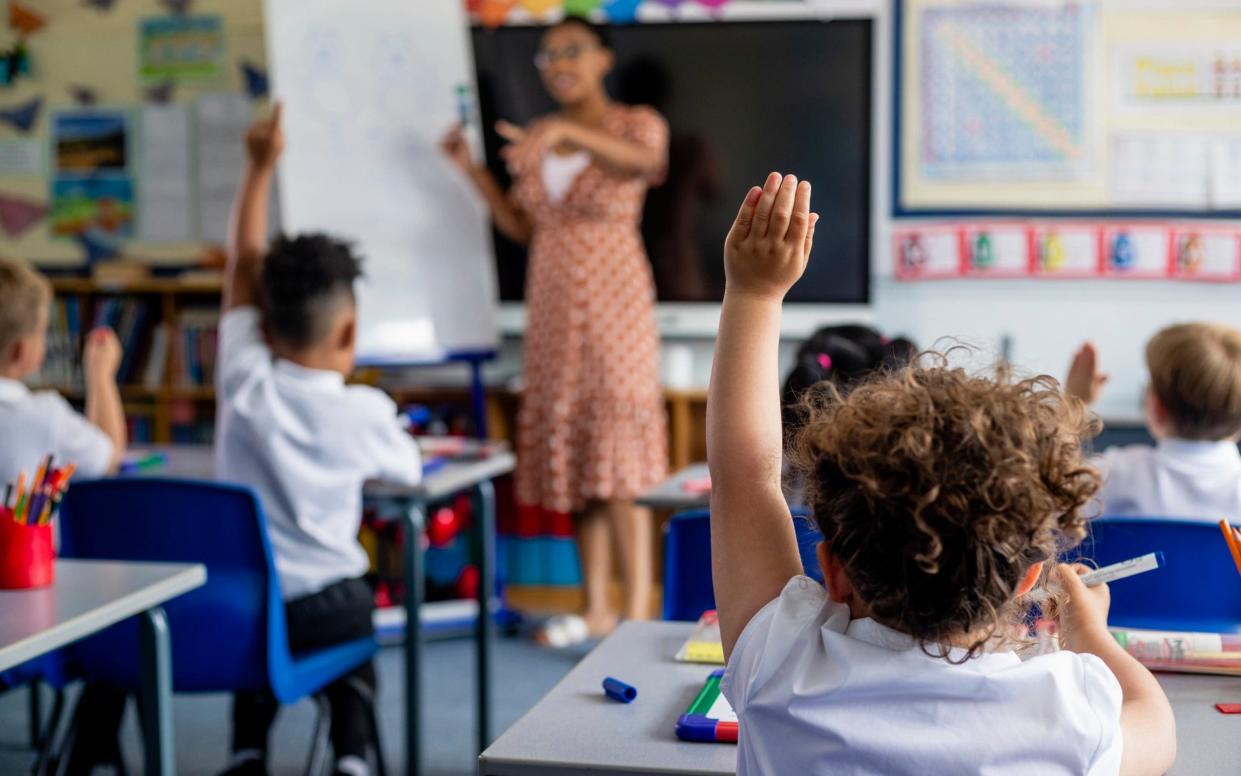Children who started school during Covid to suffer most, study finds

Children who had only just started school during the pandemic will have worse GCSE results because of the prolonged damage wrought by school closures, a study has found.
Pupils’ loss of learning and stunted social skills could become the “worst legacy” of the Covid pandemic as poorer exam results are set to “scar” a generation of children, research has suggested.
The study, published on Wednesday by academics from the universities of Exeter and Strathclyde, and the London School of Economics, analyses how school closures during Covid-19 hindered children’s development at age five, 11 and 14.
Analysis
How lockdown broke a generation
It predicts that boys aged five during Covid school closures are up to 4.4 percentage points less likely to achieve five GCSE passes, the equivalent of at least a grade 4, or A* to C, than children who took their GCSEs in 2023.
The study suggests the impact on GCSE results will be greater for children who were younger during the pandemic.
It showed that there was a particularly adverse impact on the academic and social skills of children in their formative years. Research has found that cognitive skills at age five are highly predictive of cognitive skills later in childhood.
Girls aged five during the pandemic are 4.8 percentage points less likely to achieve five good GCSEs, according to the model.
Pupils who were five at the start of the first lockdown would be nine today.
The study, funded by the Nuffield Foundation, forecasts that fewer than four in ten pupils in 2030 will achieve grade 5 or above in English and mathematics GCSEs. In 2022-23, 45.3 per cent of pupils in England achieved this benchmark.
The research comes days after Indermit Gill, chief economist of the World Bank, described the closure of schools as the “biggest mistake” made during pandemic lockdowns.
Prof Lee Elliot Major, one of the report authors and a professor of social mobility at the University of Exeter, said: “Poorer GCSE results will scar successive cohorts of children well into the 2030s, signalling a decline in the country’s social mobility levels.”
He added: “We’ve had lots of debates about the pandemic, it could be that the sort of worst legacy of all is actually the damage to the education of a whole generation of children.”
Researchers developed a model of skills development using data from the Millennium Cohort Study, which follows the lives of around 19,000 children born in the UK at the turn of the century.
The model was applied to later pupil cohorts to estimate how GCSE results will be impacted by disruption from school closures during the pandemic.
The research found that socio-emotional skills including the ability to cooperate with others, show empathy, and maintain attention, are as important as cognitive skills, such as reading and writing skills and fluid reasoning, in achieving good GCSEs and decent wages after school.
However, it found that school closures deprived children of access to emotional support and social interaction.
In England, the Government’s catch-up programme has focused on academic progress.
Prof Elliot Major said that children under five during lockdown could also be at risk of long-term impacts on their development.
He said: “The early years are so critical in shaping trajectories in school and beyond. All this came at a time when parents were also struggling during the pandemic.
“While we were not able to look at younger children, below age five, I know from speaking with teachers across the country that there are real concerns that pre-school children at the time of pandemic are coming into the school system under developed, whether it is lack of potty training or under-developed language and social skills.”
Tutors and mentoring
The report calls for a number of “low-cost” policies to be introduced, including a national programme of university undergraduate tutors delivering academic and mentoring support to pupils to help boost their foundational cognitive and socio-emotional skills.
Dr Emily Tanner, programme head at the Nuffield Foundation, said: “The mounting evidence on the long-term impact of learning loss on young people’s development shows how important it is for students to develop socio-emotional skills alongside academic learning.”
Pepe Di’Iasio, general secretary of the Association of School and College Leaders, said: “This important research is a devastating warning that must be heeded by policymakers – educational standards are at risk of going into decline.”
Researchers estimate that pandemic school closures will cost the economy more than £30 billion, in today’s prices, owing to lower lifetime earnings of all pupils impacted by lockdown because of falling GCSE achievement.
Prof Elliot Major said: “A particular worry is a group of pupils who are falling significantly behind, likely to be absent from the classroom and to leave school without the basic skills needed to function and flourish in life. The decline in social mobility levels threatens to cast a long shadow over our society.”
Arabella Skinner, chief of staff at UsForThem, a parents’ group which campaigned against school closures, said: “Boris Johnson promised that ‘no child will be left behind as a result of the pandemic’ but the Government reneged on that promise.
“The outcome is that children’s life chances have been impacted - this was both predictable and predicted. This is simply not acceptable and we need to rectify this and invest in the education of our children now.”
A Department for Education spokesman said: “We have made almost £5 billion available since 2020 for education recovery initiatives, which have supported millions of pupils in need of extra support.
“We are also supporting disadvantaged pupils through the pupil premium, which is rising to almost £2.9 billion in 2024-25, the highest in cash terms since this funding began.
“This is on top of our ongoing £10 million behaviour hubs programme and £9.5 million for up to 7,800 schools and colleges to train a senior mental health lead.”

 Yahoo News
Yahoo News 
